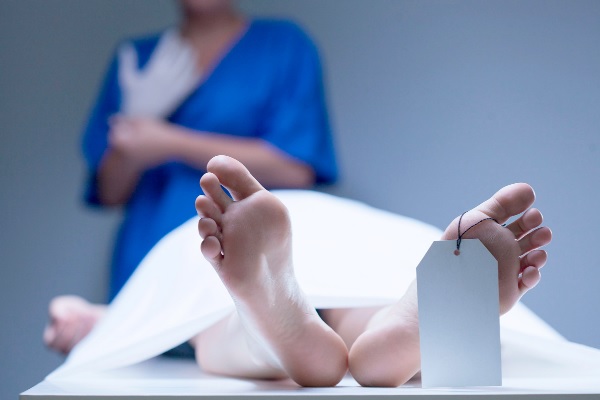The Head of the Pathology Department of the Korle Bu Teaching Hospital (KBTH), Dr Afua Owusua Darkwah Abrahams, is concerned about the decline in requests for autopsies, saying that the effect could include undetected crimes.
She mentioned other effects as the lack of proper statistics on causes of death and research into peculiar diseases and symptoms.
Dr Abrahams, who was speaking to The Mirror in an interview in Accra on November 20, 2023, said that the decline had been over the last 10 years.
She delved into the work of pathologists, challenges and public misconceptions.
“When I first started, a team of two or three doctors could perform about 100 autopsies weekly. However, currently, cases are not up to 20,” she said.
She added that the department was currently doing more surgical pathology and cytopathology, where a request for analysis of part or whole of a damaged human organ, tissue or cell was examined.
![]()
Dr Afua Owusua Darkwah Abrahams, Head of Pathology, Korle Bu Teaching Hospital (KBTH)
Dr Abrahams attributed the low autopsy cases to the influx of funeral homes, ineffective regulations, in-office diagnoses by some doctors, limited number of practitioners, unawareness and religious superstitions.
She observed that autopsies remained one of the least patronised services within the medical practice of pathology in the country.
Dr Abrahams is the first female to hold the office and possesses 13 years of experience as a Consultant Pathologist.
Dr Abrahams is also the Head of the Pathology department of the University of Ghana Medical School (UGMS) and serves on boards including the Medical and Dental Council and the University of Ghana Academic Board.
Importance of autopsies
Joining the conversation, a Consultant Pathologist at KBTH, Prof. Edwin Kwame Wiredu, who has been practising for over 38 years and is also a Professor of Pathology at the UGMS, recounted how findings from autopsies helped in the introduction of vaccines for children in the country.
“When I first started as a pathologist, five out of 10 bodies to be examined will be children. Out of these five children, four of them died from a combination of measles and kwashiorkor,” he said.
On how important autopsies are, Prof. Wiredu gave an example of how a court ordered an autopsy, and it was discovered that a death which was thought to be a hit and run was found to be a murder.
“During the investigations, it was found that the man’s heart was missing. He was actually murdered and the body was put on the road to make it seem as if it was a hit and run,” he added.
The consultant recalled how a patient who was treated and discharged for breast cancer and was thought to be in remission returned later with symptoms similar to stroke.
It was discovered later that the cancer that was supposedly in remission had actually progressed into her brain.
Prof. Wiredu explained that pathology is a field of medicine that examines dead bodies, cells, tissues or organs of a person to determine the cause of death, researches diseases, explains unusual presentations of diseases and provides statistics that help doctors make informed decisions.
He said it also helped doctors to learn and improve on knowledge to reapply the knowledge when presented with similar cases.
Prof. Wiredu quoted what he said was his favourite phrase: “The wealth of a nation is dependent on the health of its people and when you do not know what is killing people, you cannot stop them from dying.”
Prof. Wiredu corroborated Dr Abrahams’ concern about the decline in requests for autopsies, saying that 20 years ago, a lot of autopsies were conducted, which led to the discoveries of so many crimes, including one where the victim had already been buried for close to 10 years.
He said after an exhumation and examination of tissue remains, the murder was discovered and the culprit punished.
Public sentiment
In separate interviews, The Mirror spoke to an Employee Health Manager, Mrs Gifty Yaokumah, on her thoughts on autopsies.
She said that seven years ago, she had wanted one performed on her uncle who had died but the family refused.
“A family member who lived in Togo had already been declared as the culprit after consultation with the family god in Togo. My uncle’s spirit supposedly showed up and identified his attacker,” she claimed.
A carpenter, Mr Isaac Innusah, said he did not know much about autopsies and could not even afford one if he did.
Misconceptions
Addressing such public sentiments, Dr Abrahams and Prof. Wiredu dispelled the superstitious notions saying, “The dead does not speak, cry or perform spooky activities; and no, we do not have nightmares.”
“I have worked on over 100,000 dead bodies but I have yet to experience such an encounter,” Prof. Wiredu said.
“To us, they present medical problems/questions that we have to resolve. Our training provides the mental and emotional fortitude to remain detached. However, sometimes, you may feel some emotional attachment to the cases, especially if it involves injustice to children,” he added.
Dr Abrahams encouraged the public to educate themselves and trust the expertise of pathologists because some causative ailments may be genetic.
Challenges
A major challenge, Dr Abrahams mentioned, was the inadequacy of funding for the purchase or improvement of more advanced tools, equipment and laboratory infrastructure.
She added that the role of pathologists, often behind the scenes, demanded precision, empathy and a deep understanding of the human body.
“As such, lots of medical students do not pursue it, especially due to the volume of courses and duration of study (five years). Thankfully, however, now more doctors, especially women, are finding the field interesting and are pursuing it,” she noted.

